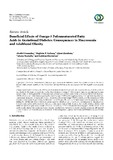Beneficial effects of omega-3 polyunsaturated fatty acids in gestational diabetes: consequences in macrosomia and adulthood obesity

View/
Date
2015Author
Mashalla, Yohana
Yessoufou, Akadiri
Nekoua, Magloire P.
Gbankoto, Adam
Moutairou, Kabirou
Publisher
Hindawi Publishing Corporation//www.hindawi.com/journals/jdr/Type
Published ArticleMetadata
Show full item recordAbstract
Omega-3 polyunsaturated fatty acids (PUFAs) are increasingly being used to prevent cardiovascular diseases, including diabetes and obesity. In this paper, we report data on the observed effects of omega-3 PUFA on major metabolic disorders and immune system disruption during gestational diabetes and their consequences on macrosomia.While controversies still exist about omega-
3 PUFA effects on antioxidant status regarding the level of omega-3 PUFA in diet supplementation, their lipid-lowering effects are unanimously recognized by researchers. Animal studies have shown that omega-3 PUFA contributes to the maintenance of the immune defense system by promoting the differentiation of T helper (Th) cell to a Th2 phenotype in diabetic pregnancy and by shifting the Th1/Th2 ratio from a deleterious proinflammatory Th1 phenotype to a protective anti-inflammatory Th2 phenotype in macrosomia and in adulthood obesity that results from macrosomia at birth. Based on the available evidence, international nutritional and food agencies recommend administration of omega-3 PUFA as triglyceride-lowering agents, for the prevention of cardiovascular disease risk and during human pregnancy and lactation. Furthermore, studies targeting humans are still required to explore application of the fatty acids as supplement in the management of gestational diabetes and inflammatory and immune diseases.
